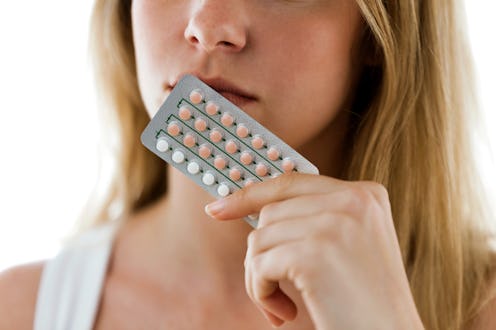Life
Do You Ovulate On Birth Control Pills?

If you take birth control pills, or you’re trying to find the best method of contraception for you, you may have asked yourself, “Do you ovulate on birth control pills?” The short answer is “No.” Birth control pills are designed to prevent ovulation, and, on the off chance that you do ovulate while on the pill, it works with two other back up methods to prevent pregnancy. That’s why the pill is so good at preventing pregnancy — in fact, it’s more than 99% effective when used perfectly.
"The pill stops ovulation by inhibiting the hormones in the brain that normally tell the ovaries to release an egg," Dr. Jane van Dis, OBGYN & Medical Director of Maven Clinic, tells Bustle. "The most important component of this – the hormone that would normally tell the ovary to mature an egg for release is suppressed. In addition, the birth control pill makes the lining of the uterus less suitable for implantation of a fertilized egg, thickens cervical mucus to make it harder for sperm to pass, and impairing the mobility of an egg moving through the fallopian tubes."
A lot of people don’t fully understand how different methods of contraception work. In fact, a surprising number of people are confused about how their own reproductive systems function, so if your first thought upon reading the title of this article was, “Er, wait. What’s ovulation again?”, there’s no need to feel embarrassed. Let’s start with the basics:
What is ovulation and how does my birth control affect it?
Ovulation occurs as part of your menstrual cycle. You ovulate midway through your cycle, when your ovary releases a mature egg into your fallopian tube. If you have sex, and sperm makes its way to the egg, it can fertilize the egg; the egg will implant on the lining of your uterus, and Bam! You’re pregnant. If you don’t ovulate, you can’t get pregnant because you aren’t releasing any eggs, and therefore there is nothing to fertilize. So when a medication like the pill stops you from ovulating, it also stops you from getting pregnant. Simple, right?
Although the logic of the birth control pill is fairly straightforward (no ovulation = no babies), learning how the pill actually works requires a more in-depth understanding of the role that hormones play in the menstrual cycle. At the beginning of your cycle, your hypothalamus releases a hormone that signals to your pituitary gland to release two more hormones, FSH (follicle stimulating hormone) and LH (luteinizing hormone). FSH and LH travel through the blood into the ovaries, where the FSH gives the signal to the ovaries to start developing a mature egg. Your estrogen levels shoot up during this period. The estrogen causes the uterine lining to thicken in preparation for implantation of a fertilized egg, and it signals the pituitary gland to release a swell of LH, which causes ovulation. Your cervical mucus thins out, so that sperm can get through more easily.
Birth control works by releasing hormones into your body to prevent these things from happening. Combination birth controls contain two synthetic hormones: Estrogen and progestin. (The mini-pill contains progestin only). According to Harvard Health, the estrogen helps to prevent ovulation by stopping the pituitary gland from releasing FSH and LH. The absence of FSH means that your ovaries don’t begin the process of producing a mature egg. The progestin stops the pituitary gland from releasing the surge of LH that would normally tell your ovary to release the egg (aka ovulation).
What else does the pill do to prevent pregnancy?
The hormones in your birth control do more than simply prevent ovulation (although that’s a lot on its own!). When the progestin prevents the pituitary gland from releasing LH, it stops ovulation, but it also keeps your uterine lining from thickening — so that, even if an egg was somehow released and fertilization were to occur, the egg would have a very hard time implanting on the uterine wall. The pill also stops your cervical mucus from thinning, so that sperm that reach the cervix have to get through a thicker, more impenetrable wall.
Thus, the birth control pill prevents pregnancy in three key ways: It keeps you from ovulating, it makes your cervical mucus thick and inhospitable to sperm, and it prevents your uterus from creating an egg-welcoming lining.
Pretty cool, right? The pill is really good at preventing unwanted pregnancy — but it’s important to be aware that the pill is only effective if you take it as instructed. The pill works by providing your body with a steady stream of hormones that direct your hypothalamus, pituitary gland, and reproductive system to act in certain ways. "There are a significant number of pregnancies in the U.S. every year that are a result of birth control failure, due primarily to missed pills," Dr. van Dis says. "The absolute best is to take the pill at the same time every day." If you want it to be as effective as possible, then you need to take it regularly, so that your stream of hormones isn’t interrupted or uneven. (That’s why most pill packs instruct you to take your pills at the same time every day).
If you have trouble taking your pills at the same time everyday, talk to your doctor about switching to one of the many birth control methods that don’t require a daily pill (including other hormonal contraceptives like the patch or ring, implants, and IUDs).
Additional reporting contributed by Syeda Saad.
This post was originally published on May 24, 2016. It was updated on July 15, 2019.
This article was originally published on